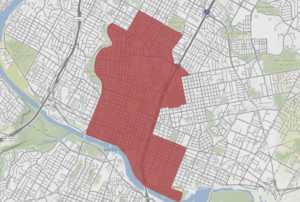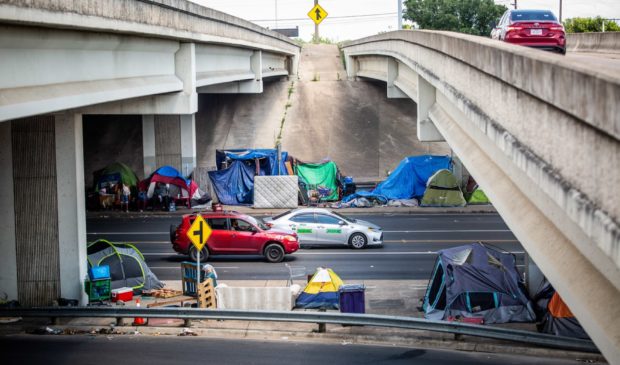Photo by Gabriel C. Pérez/KUT
Austin police can start ticketing people for panhandling and camping or sitting in public
Monday, June 14, 2021 by
Andrew Weber, KUT The Austin Police Department will begin enforcing a city ban on camping in public that was reinstated by Austin voters last month.
Proposition B, the citizen-led effort to reinstate the rules, officially went into effect May 11, but the city adopted a staggered approach to enforcing the ban, along with prohibitions on panhandling and sitting or lying down in public.
APD said police have visited more than 40 encampments over the last month to tell people they’re violating the law. As of Sunday, officers can issue warnings and fines of up to $500. Interim Police Chief Joseph Chacon has said he wants officers to rely more heavily on verbal and written warnings over the next month.
Starting July 11, APD said, officers will issue tickets to folks who’ve been given written warnings. Starting Aug. 8, they can arrest people who refuse to move.
Chacon has said he wants arrests for violating the ordinances to be a “last resort.”
How does APD plan on enforcing this?
APD’s training bulletin defines a camp as a public place at which people are storing personal belongings “for an extended period of time” – whether it be in a tent or a shelter. Vehicles are not explicitly included in the ordinance, but APD’s guidelines suggest officers can issue citations for people sleeping in cars, too.
Officers are required to inform people of where they can legally camp or find shelter. Under the guidelines, lawful campsites include the Esperanza Community, a state-sanctioned encampment off U.S. Highway 183 in Southeast Austin, as well as Austin’s Emma Long Metropolitan Park and McKinney Falls State Park. The city is expected to provide additional options at a later date.

The area in which it’s illegal to sit or lie down (Map by KUT)
Prop B reinstated the rules on sitting or lying down in public that were in place before July 2019. It’s illegal to sit or lie down in stretches of downtown, West Campus and East Austin, though APD’s guidelines say officers should focus enforcement efforts on areas “near busy roadways and areas that pose a higher risk of wildfire or flooding.”
As before, officers are required to give a 30-minute notice before citing folks who are sitting or lying down in a prohibited area. If someone is found “within a few blocks” within “3-4 hours,” people “may be presumed to already have notice and may be cited without an (additional) 30 minute notice period,” the bulletin reads.
If police arrest someone for violating the ordinances, they’re required to make sure the person’s personal belongings are stored in a place where they can later be retrieved.
What’s next?
For decades, Austin has failed to provide adequate emergency shelter for people experiencing homelessness. While there are ongoing discussions at City Hall about expanding capacity, it’s unclear when so-called “crisis beds” to temporarily house folks will be available. As part of the HEAL initiative, the city is planning to open a temporary shelter at the Rodeway Inn near Oltorf Street and Interstate 35 this summer to house people being moved out of encampments.
The city is also trying to set up temporary campsites on city-owned land, but that plan has proved both controversial and difficult. Austinites balked at the slate of potential sites, which included public parks.
On top of that, state lawmakers passed a bill this session that would ban cities from using parkland for temporary encampments. Staff told City Council last week that would eliminate the use of all but one of the 45 proposed sites.
Council members hope to leverage at least $100 million in federal relief money from the American Recovery Plan to both build out more permanent supportive housing and address the longstanding need for emergency shelter capacity.
This story was produced as part of the Austin Monitor’s reporting partnership with KUT.
The Austin Monitor’s work is made possible by donations from the community. Though our reporting covers donors from time to time, we are careful to keep business and editorial efforts separate while maintaining transparency. A complete list of donors is available here, and our code of ethics is explained here.
You're a community leader
And we’re honored you look to us for serious, in-depth news. You know a strong community needs local and dedicated watchdog reporting. We’re here for you and that won’t change. Now will you take the powerful next step and support our nonprofit news organization?








